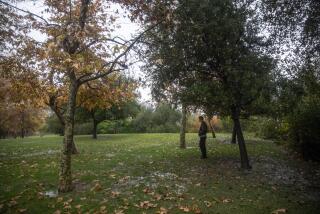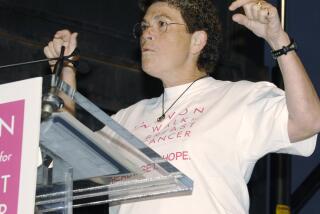Talking Helps Prostate Tumor Patients Cope
- Share via
Edward C. Kaps found out he had prostate cancer in 1978. He got radiation to shrink the tumor, but the cancer returned 10 years later just when he thought he had nothing to worry about.
“After the second bout, I felt I needed to talk to someone other than my family. They were supportive but they didn’t walk in my shoes,” Kaps, 65, said from his winter home in Scottsdale, Ariz.
His second incident occurred just as he was about to retire as director of industrial relations at General Motors. Anticipation of days of care-free leisure quickly sank to fears of isolation and frustration.
Kaps approached his doctor, Gerald Chodak, at the University of Chicago and suggested a support group. Among 100 invited patients, 21 men and 14 women attended the first meeting in February, 1990.
Prompted by the popular breast cancer support group, “Why Me?” Kaps named his club “Us Too,” to emphasize that men need to share their feelings with other cancer sufferers.
Us Too has expanded into an international nonprofit agency, with 110 chapters and about 10,000 members throughout the United States and Canada, and one chapter in Istanbul, Turkey.
Florida has a Spanish-speaking group called “Nosotros Tambien.” Canada has a French-speaking group, “Nous Aussis.” The Turkish group is “Bisde Variz.”
Dr. Judd Moul, a urological oncologist at Walter Reed Army Medical Center in Washington, D.C., said he was a bit squeamish about the concept of a support group when he was approached by members of his staff.
“I’m a surgeon. I don’t consider myself a touchy-feely doctor,” Moul said.
“Once you get involved you see how much patients and staff benefit. I was amazed how much in the dark some patients are with regards to their disease and the willingness of patients to get up and tell their stories. It’s been an incredible, positive experience.”
Most meetings, which are usually about once a month, include a guest speaker, a cancer expert or psychologist, and patients discussing side effects, such as impotence and incontinence.
“Prostate cancer is doing what breast cancer did 15 years ago,” said Brooke Moran, coordinator of Us Too in Baltimore, Md. “Men are finally starting to speak out and learning to play an active role in health care issues.”
“Us Too gives people an opportunity to talk among themselves and ask other patients or the guest speaker to explain things they wouldn’t want to talk to their doctor about,” said Kent Leach, who is the coordinator for the support group in Scottsdale.
“We men are behind the eight ball,” Moul said. “Ten years ago, people would never have thought men would have been this open. These groups are helping to dispel that myth.”
EDITOR’S NOTE: For information write: Us Too, 300 W. Pratt St., Suite 401, Baltimore, Md. 21201.
More to Read
Inside the business of entertainment
The Wide Shot brings you news, analysis and insights on everything from streaming wars to production — and what it all means for the future.
You may occasionally receive promotional content from the Los Angeles Times.










